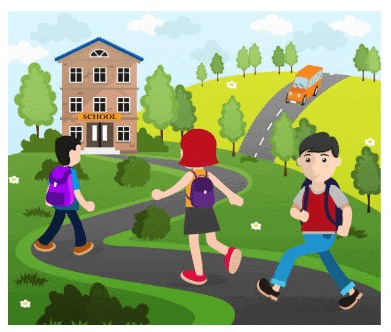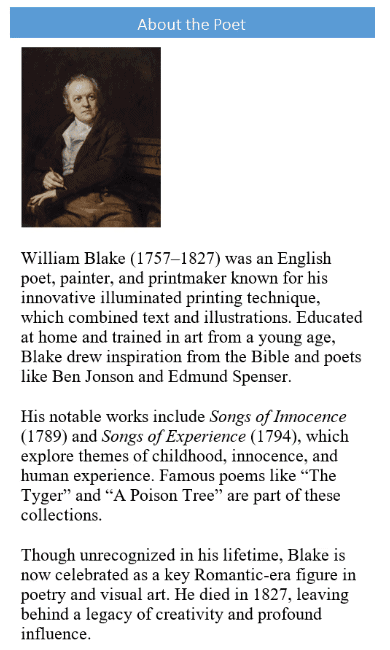Poem - The School Boy NCERT Solutions | English Class 8 PDF Download

Working with the Poem (Page 81)
Q1. Find three or four words/phrases in stanza 1 that reflect the child’s happiness and joy.
Ans. The words/phrases that reflect the child’s happiness and joy are:
- The song of birds
- The skylark
- The sound of the hunter’s horn
Q2. In stanza 2, the mood changes. Which words/phrases reflect the changed mood?
Ans. The words/phrases reflecting the child's mood are:
(a) drives all joy away
(b) cruel eye outworn (of the Teacher)
(c) sighing and dismay
Q3. ‘A cruel eye outworn (stanza 2)’ refers to
(i) the classroom which is shabby/noisy
(ii) the lessons which are difficult/uninteresting
(iii) the dull/uninspiring life at school with lots of work and no play.
Mark the answer that you consider right.
Ans. (iii) the dull/uninspiring life at school with lots of work and no play.
Q4. ‘Nor sit in learning’s bower worn thro’ with the dreary shower’ Which of the following is a close paraphrase of the lines above?
(i) Nor can I sit in a roofless classroom when it is raining.
(ii) Nor can I learn anything at school though teachers go on lecturing and explaining.
(iii) Nor can I sit in the school garden for fear of getting wet in the rain.
Ans. (ii) Nor can I learn anything at school though teachers go on lecturing and explaining.
Additional Questions Solved
Q1. What is the mood of the school boy?
Ans. The school boy is unhappy.
Q2. What makes the school boy unhappy?
Ans. The schoolboy is unhappy because:
a) He has to attend school even on a summer morning when there is so much to enjoy in the open fields and forests.
b) His teacher is harsh, and the lessons are uninteresting.
Q3. Why does the boy compare himself to a caged bird?
Ans. The boy compares himself to a caged bird because he is not free to do what he wishes. Like a bird confined to a cage, he feels restricted and longs for a life of freedom.
Q4. What is the poet’s advice to parents of school‑going kids?
Ans. The poet calls upon the parents to let their kids grow and play joyfully in their early years. They should not restrict their natural activities.
Q5. Why does the schoolboy compare himself to a plant?
Ans. The schoolboy compares himself to a plant because a child, like a tender plant, needs care and freedom to grow. If suppressed too much, the child, like a plant crushed at the bud stage, will fail to bloom and achieve their full potential.
|
36 videos|329 docs|56 tests
|
FAQs on Poem - The School Boy NCERT Solutions - English Class 8
| 1. What is the main theme of the poem "The School Boy"? |  |
| 2. How does the poet describe the feelings of the schoolboy in the poem? |  |
| 3. What imagery is used in the poem to convey the boy's longing for freedom? |  |
| 4. How does the poet contrast nature with the school environment in "The School Boy"? |  |
| 5. What message does the poet convey about education in "The School Boy"? |  |























